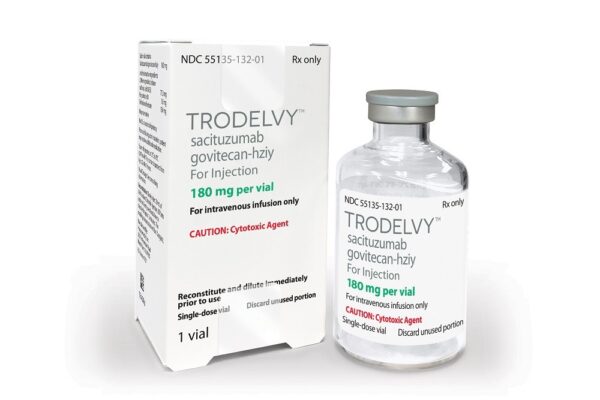
The FDA has expanded the approval of a Gilead Sciences drug, a decision that clears the way for the therapy to reach more patients and potentially achieve the blockbuster status the company hoped for when it acquired the therapy in a multi-billion dollar deal.
The drug, Trodelvy, was initially approved for treating triple negative breast cancer, a rare but aggressive breast cancer. The expanded approval announced Friday covers adults with advanced HR positive and HER2 negative breast cancer, which is the most common type of breast cancer. Those patients must have received previous treatment with an endocrine-based therapy as well as two additional systemic therapies to address the cancer’s spread.
Trodelvy belongs to a class of cancer therapies called antibody drug conjugates, which are comprised of tumor-targeting antibodies chemically linked to a cancer-killing drug payload. The targeting ability of the antibody is intended to deliver a direct strike to tumors that spares healthy tissue. The antibody part of Trodelvy is designed to target Trop-2, an antigen found in abundance on the surface of many cancer types, including more than 90% of breast and bladder cancers.
In its Phase 3 test enrolling more than 500 HR positive/HER2 negative breast cancer patients, treatment with Trodelvy met the main goal, showing 34% improvement in progression-free survival, which is a measure of how long patients live without their cancer worsening. Those results were presented last year during the annual meeting of the American Society of Clinical Oncology.
The study also met a secondary goal of overall survival, defined as the period starting with randomization in the study up until death from any cause. According to this measure, patients in the Trodelvy group lived a median 14.4 months compared to a median 11.2 months in the chemotherapy arm, a 3.2 month difference that was enough to be statistically significant. Those results were presented last September during the European Society for Medical Oncology Congress 2022.
“This approval is significant for the breast cancer community,” Hope Rugo, principal investigator of the Phase 3 study and director, breast oncology and clinical trials education at the UCSF Helen Diller Family Comprehensive Cancer Center, said in a prepared statement. “We have had limited options to offer patients after endocrine-based therapy and chemotherapy, and to see a clinically meaningful survival benefit of more than three months with a quality of life benefit for these women is exceptional.”

A Deep-dive Into Specialty Pharma
A specialty drug is a class of prescription medications used to treat complex, chronic or rare medical conditions. Although this classification was originally intended to define the treatment of rare, also termed “orphan” diseases, affecting fewer than 200,000 people in the US, more recently, specialty drugs have emerged as the cornerstone of treatment for chronic and complex diseases such as cancer, autoimmune conditions, diabetes, hepatitis C, and HIV/AIDS.
The study also enrolled patients whose cancer was positive for HER2, but at levels that were previously thought to be too low for HER2-targeting drugs. Gilead said that a post-hoc analysis of trial data showed Trodelvy was effective in treating such “HER2-low patients.” That sets the drug up for competition with AstraZeneca and Daiichi Sankyo drug Enhertu, which last summer won the first FDA-approval in HER2-low patients, establishing a new category of breast cancer patients.
Trodelvy won its first approval in 2020 in the hands of Immunomedics. Gilead added Trodelvy to its portfolio with the $21 billion acquisition of that company later that year. In 2022 financial results reported last week, Gilead said Trodelvy revenue totaled $680 million, a 79% increase compared to 2021. The company attributed the sales growth to continued adoption of the drug as a treatment for triple negative breast cancer in the U.S. and Europe.
Gilead signaled its global ambitions for Trodelvy last summer. Rights to the drug in Asia were held by Everest Medicines under a 2019 deal struck with Immunomedics. Last August, Gilead struck its own deal with Everest, paying $280 million up front to reacquire those rights.
Use of Takeda Rare Disease Drug Expands to Children as Young as 2
In other expanded approval news, the FDA greenlit the use of a Takeda Pharmaceutical rare disease drug in a younger group of patients.
The drug, Takhzyro, treats hereditary angioedema (HAE), an inherited disorder that leads to swelling attacks throughout the body. When this swelling closes off the airway, it can lead to death. Subcutaneously injected Takhzyro is an antibody designed to prevent HAE swelling attacks by blocking kallikrein, a protein associated with the disorder. The 2018 approval of the drug covered patients age 12 and older. The FDA on Friday expanded that approval to include patients as young as 2.
Photo by Gilead Sciences













